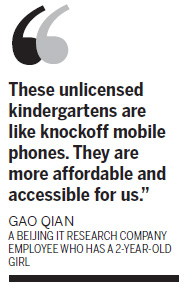China
Unlicensed schools put to quality test
Updated: 2011-02-24 07:36
By Chen Jia (China Daily)

BEIJING - The central government will launch a campaign to overhaul the country's large number of unlicensed kindergartens, said a senior official with the Ministry of Education (MOE) on Tuesday.
Those schools that meet the new standards will be granted licenses.
"Unlicensed private-run kindergartens became popular because public-funded, low-cost kindergartens were not numerous enough," Li Tianshun, deputy director of the second basic education department under the MOE, told a news conference on Tuesday.
"More than 40 percent of the Chinese children who are of pre-school age have not entered kindergarten," he said.
"The children at unlicensed kindergartens are vulnerable to various hazards," he said. "So we need to figure out a way to protect their rights."
He also said the country needs to spend more on pre-school education and diversify the forms that such schooling can come in.
In Beijing, the number of licensed kindergartens has dropped from 3,056 in 1996 to 1,266 in 2010, according to the city's education commission.
The city, which has an estimated population of more than 20 million, had only 383 first-class kindergartens in 2010, according to Xinhua News Agency. And the void left by the absence of good schools is steadily being filled by suspect ones.
By June 2009, the number of unlicensed kindergartens in Beijing had risen to 1,298, according to the city's pre-school education mechanism research team.
In addition, children born in 2007, a year considered to be particularly auspicious in the Chinese calendar, and 2008, the year of the Beijing Olympics, are reaching kindergarten age. The birth rates recorded for those two years skyrocketed in Beijing, Shanghai and other major cities in China.
"These unlicensed kindergartens are like knockoff mobile phones," Gao Qian, a local IT research company employee who has a 2-year-old girl, told China Daily on Wednesday.
"They are more affordable and accessible for us," Gao added. "I have no social connections that can help my child get into public-funded kindergarten, while the private-run kindergartens with good reputations are also for the rich parents."
"Without these so-called unlicensed kindergartens, I would have to ask my mother to live with us and take care of my daughter."
Gao Yuan, a 28-year-old mother, said she plans to submit an application this year to move to Canada. She decided on that course of action after she was told she must pay 6,000 ($912) yuan a month for her son to attend a bilingual kindergarten.
Figures from the Beijing bureau of statistics show that urban residents of Beijing in the past year made an average monthly income of 2,400 yuan.
Li Tianshun said a national regulation to control the attendance fees and other expenses charged by kindergartens will be passed this year.
It will govern which services kindergartens may charge for and how those charges will be managed.
But the regulation will not specify "standard charges" that can be imposed by kindergartens, since the cost of maintaining such schools varies from region to region.
"The government should support private-run kindergartens by providing more money and teaching resources," said Xiong Bingqi, deputy director of the 21st Century Education Research Institute.
"The private-run kindergartens cannot be fully managed by the local governments and can barely get resources from authorities, since pre-school education is not included in the compulsory education system."
China Daily
Specials

Kremlin buddies
Dmitry Medvedev and Vladimir Putin inspect Olympic preparations.

Lantern Festival
The Lantern Festival is celebrated across China.

New York Fashion Week
Models line up before a show during New York Fashion Week.